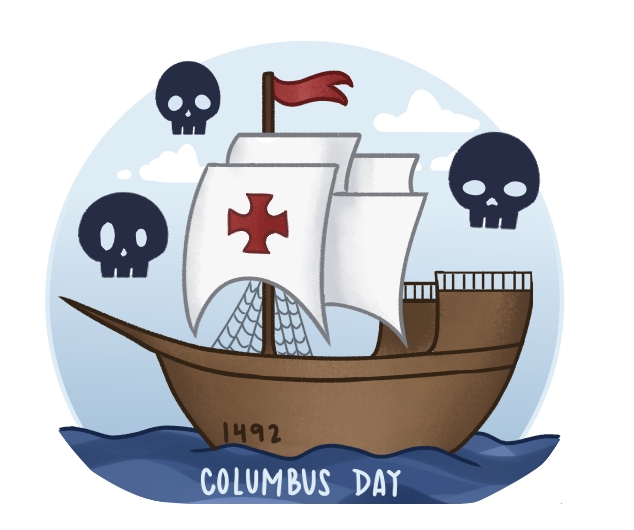
By Justin Hsieh, Staff Writer
Today, the second Monday of October, is federally recognized as Columbus Day. Although this holiday has been observed in the United States for eight decades, it has recently become embroiled in controversy for a very good reason. The day on which Christopher Columbus led three Spanish ships to make landfall in the Bahamas, a day celebrated as the beginning of a grand new era for the West, was also the beginning of a new age for the “Indians” he “discovered”: an age of brutal conquest, exploitation and cultural obliteration. This is the real legacy of Columbus Day.
Although celebrated since 1792, Columbus Day first became a nationally recognized holiday when established by President Franklin D. Roosevelt in 1937. The rationale behind the holiday is primarily to recognize of Columbus’ achievements for Western civilization, as well as honor the explorer’s Italian-Catholic heritage. It’s a celebration of the beginning of American life as we know it, the day on which the seeds of our current social, cultural and political heritage were brought from Europe to this new land where we now live.
This very conception of Columbus Day, however, betrays the deep attitudes of Eurocentrism and cultural egotism that not only underlie modern observance of Columbus Day, but also allowed countless Europeans including and after Columbus to commit appalling acts of paternalism and atrocity under the banner of righteousness.
The future of the Americas under European control was clearly represented even by Columbus’ very first voyage. Upon completing his first exploration of the Caribbean, Columbus returned to Spain with gold that he had forced the natives into giving him and captive “Indians” that he had taken from their tribes. As he reported to the Spanish monarchy, he had found on the islands an opportunity for the procurement of “as much gold as [the monarchs] need” and for “the salvation of the souls of so many nations hitherto lost.”
Columbus’ proclamation of the riches in wait for the Spanish opened the doors wide for further domination and decimation of Native American peoples. Within 40 years of Columbus’ initial discovery of the New World, the flourishing Aztec and Inca empires had been razed, millions of Native Americans had been killed by epidemic disease and Columbus himself had ordered the brutal suppression of a Native American revolt, sent thousands of Native Americans away to be sold in Spain and forced those not sent away or killed to work as slaves in Spanish gold mines.
Clearly, the implications of Columbus’ discovery were disastrous for Native Americans. However, for many people, the point of Columbus Day is not a commemoration of the explorer’s actions, but of his Italian heritage. Indeed, many Columbus Day celebrations have evolved to become full-on celebrations of Italian-American culture. The issue here is that, while there is certainly no problem with having strong cultural pride, this specific case is far too deeply entangled with the subjugation and suffering of one culture for it to be rightfully celebrated by another. Christopher Columbus was not a proud, hardworking Italian-American immigrant; he was a man who treated real Americans’ lives and cultures as tools for, or obstacles to, personal wealth, power and glory.
The darker side of Columbus’ record has not gone unnoticed. In the past twenty-six years, a number of prominent U.S. cities, universities and states have chosen to replace Columbus Day with an “Indigenous Peoples’ Day” aimed at honoring the history and culture of Native American tribes. Locally, Long Beach and both the city and county of Los Angeles observe this alternative holiday. In Fountain Valley, however, the library, banks and postal service all remain non-operating in observance of Columbus Day.
The story of Christopher Columbus is complicated. Under the cultural influences of fifteenth-century Europe, he may genuinely have believed that he was doing a great service both to the Spanish and to the people he found in the Americas. Furthermore, many things that resulted from his discovery of the Americas were in fact beneficial to both Europeans and natives (a prime example being the introduction of Native Americans to the horse). Nevertheless, the undeniable truth is that Columbus personally caused the suffering of thousands of people and led the way for the death and enslavement of millions more. So, when we wait to send our mail or take out loans until Tuesday, we should take a second and remember not the famed European hero, but the innocent people who had their lives destroyed by the world that Columbus exposed them to.





